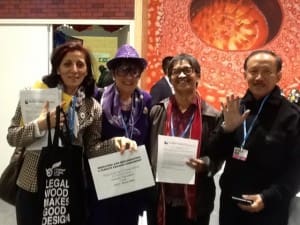MBBI at COP21 in Paris & Member Spotlight on Thomas Fiutak
By: Natasha Dyer
MBB’s Climate Change Policy Project team, along with thousands of other delegates for the 21st Conference of the Parties (COP21) headed to Paris in December 2015. After the comings and goings of the colossal 12-day event, it took time to reflect on what happened.
Gregg Walker, Suzanne Norbeck, Fatiha Osmani, Doreen Liberto Blanck, and Tom Fiutak worked brilliantly as a team to respond to the almost constant traffic of delegates and NGOs at the MBB booth.
Over 50 individuals left MBB their contact information, while another dozen-or-so professed an interest in joining the organization, and some delegates discussed how MBB could support their country or mediate regional conflict issues.
By the end of the first week, MBB had initiated a major drive to encourage delegations with a favorable response to MBB’s proposed language, to make direct contact with the delegation that had offered to sponsor MBB’s text. The team was able to demonstrate to its sponsoring delegation a significant level of support for the inclusion of “mediation” within the Paris Accords (the official agreement from the COP21 conference). Unfortunately, the rewriting of the Accords reduced the full report to just 32 pages, and the crucial term “non-judicial” was removed from the text.
Overall, however, COP21 was seen as a successful event by MBB, especially regarding the commitments made by key countries. The team will now get to work anticipating how best to approach the upcoming United Nations Framework Convention on Climate Change (UNFCC) gathering in Bonn this Spring, where according to the Paris Accords, the confirmation of details, and actionable steps, will be on the agenda.
Key Outcomes of COP21 as summarized by the MBB team:
- The extension of the current goal of mobilizing $100 billion a year, by 2020, in support for climate-change adaptation infrastructure and projects in countries most in need. A higher goal has been determined after 2025.
- Keeping global warming below 1.5 degrees Celsius (a large win for the coalition of small island states and the USA).
- A requirement that all countries submit new Nationally Determined Contributions every five years (indicating real progress in the environmental sphere).
- The extension of the mechanism for “loss and damage” resulting from climate change.
- Emphasis on forests as a central climate and development solution.
- Carbon neutrality taking shape: achieving zero carbon emissions by balancing a measured amount of carbon released with an equivalent amount offset, or buying enough carbon credits to make up the difference.
- A clearer understanding of transparency, including the accountability of parties to their commitments and re-affirmation of the use of measurement, reporting, and verification of results.
Read the official summary here
Making Connections Amongst the Fray – Interview with Thomas Fiutak, Member of MBB’s Climate Change Team
Before setting out for COP21, I spoke to Thomas Fiutak, one of the three co-leaders of MBB’s Climate Change project, as well as a professional mediator, negotiator and academic. He gave me valuable insight into MBB’s work with the United Nations (UN), and how his team is paving the way to ensure mediation plays a pivotal role in solving national and international climate-related challenges in future.
The MBB team has engaged with the UN for several years, with some impressive outcomes. These include: being invited by coalitions of country delegates to present on the power of mediation in solving climate disputes, building solid relationships with these delegations, ensuring MBB is acknowledged as a legitimate voice in negotiations (including by UNFCC’s leadership and Executive Director), and inserting the language of MBB and its network of mediators from across the world into UN documents.
MBB is the only neutral, apolitical organization involved with the UNFCC. Thomas clarified that his team does not attend these events to promote the goals of MBB as an organization. Instead, they are there to:
- Speak on behalf of all neutral actors and mediators around the world and build the capacity of the MBB team to engage with, and influence the UNFCC
- Advocate for the use of non-judicial or non- punitive ways to resolve policy disputes, implement policies and deal with mitigation and adaptation of the global climate
- To introduce language into the UN documents that directly refers to mediation and negotiation as bona fide approaches to policy implementation.
In practice, this means that MBB is not trying to modify the way the UN operates but is actually changing the set of options available to countries during climate negotiations, on issues from resettling climate-affected refugees to reducing carbon outputs. It is enhancing language that already exists, to make it more effective at dealing with disputes through constructive dialogue.
Although the media and others would have us believe that what is decided at Paris is the be-all-and-end-all, Thomas says the most important meetings happen in between the COP events, and in the run-up to them when the crucial wording is written and majority of decisions are made. MBB is very active at these times to nurture the seeds they have already planted with delegates about the benefits of mediation, building on the relationships they have already established. Though Tom says the work can be ambiguous and frustrating at times, he also stressed that the team’s conversations with UN delegates were frequently enlightening. Despite the UN’s complex structures, the work was enjoyable and fulfilling.
The good news is that delegates frequently tell MBB about disputes they have had where they needed a mediator, prompting them to opt for that approach next time. Equally, successful mediations are often reported to the MBB Climate Change team as a result of their engagement.
Tom said the challenges for COP21 were significant, and would not be solved in a couple of weeks, but that MBB would be there, taking every opportunity to promote the value of mediation and dialogue in addressing today’s significant challenges to our planet and global community.
Thomas Fiutak Bio
Thomas Fiutak is currently Senior Fellow in the Technological Leadership Institute, University of Minnesota-Twin Cities as well as Lecturer in the faculty of the Conservation Biology department. He has taught Conflict Management, and Mediation Systems in the Humphrey Institute for Public Affairs at the University of Minnesota and initiated and directed the Conflict and Change Center, which coordinated research in the areas of negotiation, mediation models, and conflict management systems.
His specific focus has been on organizational and conflict cultures and their effect on the negotiation arenas they create. Since 1985 as Fellow at the Salzburg Seminar (Austria) on Dispute Resolution, he has provided negotiation training for policymakers, government officials, educators, judges, private sector negotiators, leaders of non-government organizations, and financial officers in North America, as well as 15 other countries in Asian, Europe, and Africa. Tom is one of three Co-Founders of the Climate Change Project at Mediators Beyond Borders (MBB).


